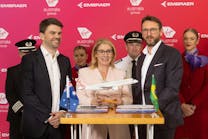Two Sides to Every Coin or a Different View on Government Subsidies to Airlines
As concerns most external forces, the airline industry is probably more vulnerable than any other industry out there. With the average jet fuel price level stubbornly refusing to drop below $120/bbl. throughout the last 12 months, IATA predicts that airlines will spend approx. $210 billion on fuel in 2014. Over the past decade global carriers have already lost $50 billion due to the global economic crisis, high fuel prices, 9/11 attacks and other factors. In order to avoid multiple bankruptcy cases, some governments choose to subsidize airlines. Though many may consider it an unfair practice, after a deeper consideration they might admit that aviation simply affects too many economic segments to leave it on its own.
According to the Air Transport Action Group (ATAG), aviation contributes 3.5 per cent to the global gross domestic product (GDP). Moreover, aviation is not only a taxpayer, but a major employer as well. The European Airbus alone employs 59 thousand people, while the American Boeing has over 170 thousand employees across the globe. Pressured by the latest financial turmoil in the airline industry, these two companies have been subsidised in various forms by their governments with a total of approx. $30 billion over the past years.
Airlines have been also subject to various types of governmental support in the recent years. The Greek Government aided the country’s local carrier Olympic Airways by writing off €2.6 billion worth of debt in 2008/09. In March 2012, the Indian Government approved a cash injection of $800 million under the federal budget for 2012/13. The European Commission has an open investigation with regard to the CZK 2.5 billion loan granted to Czech Airlines by a state-owned company.
However, troubled airlines are not the only ones to receive governmental assistance. Some industry experts believe that some European carriers have been also receiving multimillion injections in the form of advertisement contracts and other financial support from regional airports across Europe.
However, governmental support of the aviation industry is aimed not only at retaining dozens of thousands of jobs, but also at sustaining the economic development of certain regions.
One of the most successful examples is Dubai. According to the local Civil Aviation Authorities, currently the aviation sector contributes more than $39.47 billion to the UAE’s economy, or accounts for 14.7 per cent of the national GDP. Aviation have had a major impact on other economic sectors such as tourism, hospitality, trade and finance, as it is the main connector with the global markets. After all, according to Oxford Economics, approx. 97% of all foreign visitors come to Dubai by air. Acknowledging the importance of air connectivity not only for Dubai but for the entire UAE, the local government plans to secure additional $136 billion worth of investments into the aviation industry. Some of the money is alleged to support the further expansion of the UAE‘s major carriers.
“As aviation professionals contribute to the global economy 3.5 times more than any other industry representatives, no one doubts that aviation industry has a major impact on the employment. With this in mind, governmental support to the industry is fully justifiable and quite logical. However, in many cases such support contradicts with the principles of fair business environment and healthy competition. Unfortunately, with the competition among airlines from different world regions to intensify, there are certain concerns that some governments might shift towards more protectionist policies. This may eventually develop new constraints not only for airlines, but also for other aviation industry players thus tinning the active development of a truly global industry,” shared Tadas Goberis, the CEO of AviaAM Leasing.
About AviaAM Leasing
A WSE listed global aviation holding company engaged in commercial aircraft acquisition, leasing and sales. Based on its long-term expertise and business experience in Europe, the CIS and other regions, the company offers innovative and individually tailored solutions for aircraft operators, owners and other market players. The company specializes in mid-life mainline narrow-body aircraft as well as high-potential regional jets.
For more information about the AviaAM Leasing please visit: http://www.aviaam.com/



